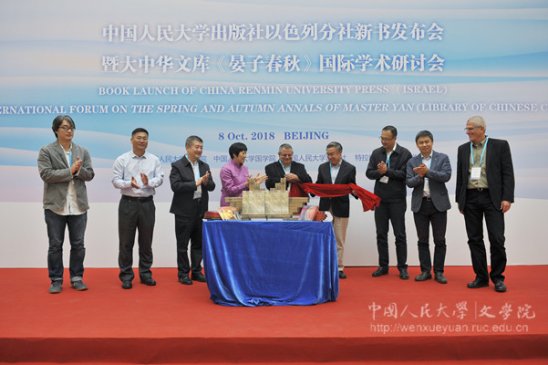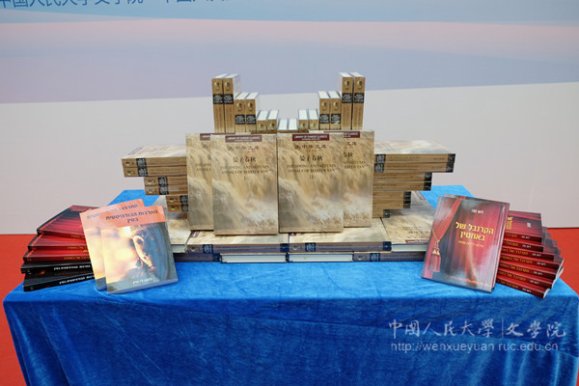International Forum: The Spring and Autumn of Master Yan and Studying Pre-Qin Scholars in the New Era
发布时间:2018-10-09By Don Kuang (Renmin University), Callisto Searle (Renmin University)
From 8th-9th October 2018, the International Forum on The Spring and Autumn of Master Yan and Studying Pre-Qin Scholars in the New Era was held in Renmin University of China (RUC), Beijing. The event was co-hosted by RUC’s School of Literature, School of Confucianism, Press House of RUC, the International Center for the Study of Ancient Texts, the Institution for Promotion of Chinese Language and Culture, the School of Classics, and the Confucius Institute of Tel Aviv University. More than 50 distinguished scholars from the Chinese mainland and abroad attend the forum and share with their research. The translation of The Spring and Autumn of Master Yan, published by the Israel Branch of the Press House of Renmin University of China, was also released at the meeting, as one of the series of the Library of Chinese Classics.

Professor Yoav Ariel (Tel Aviv University) was the first to give his speech. He compared two compositions by Bach and Mozart , which are structurally similar but distinct in melody, to analogize that the Hebrew classics and the Chinese classics indeed express the same theme through different ways. He then went further on to the different melodies of pre-Qin scholars, such as Confucius, Mengzi, and Yanzi. He pointed out that the attitude towards the future embedded in Waiting for Godot and Confucius ceasing his writing after the Huolin獲麟 are quite different, and this kind of comparative study will promote universal ideas of philosophy and prevent culture centralization, dangerous cultural impressions and cultural racialism from developing and threatening our world.

Professor Andrew H. Plaks (Princeton University) based on the text of The Spring and Autumn of Master Yan, revaluated the importance of Yanzi in the Pre-Qin period as a Master. He came up with new ideas regarding the long-term debate about which school Yanzi really belonged to, Confucianist or Mohist. He also tried to reconstruct the consistent philosophical position that is hidden behind the complicated stories in The Spring and Autumn of Master Yan.
Professor Roger T. Ames (Peking University) from the perspective of translation and interpretation, pointed out that the Lunyu has been through a process that the text itself is being over reconstructed, entitled with authoritative statue and individually interpreted through the long term of history. The text and all its derived texts are merged into one entity, which exactly reflects the Process Cosmology Theory of the Yijing Dazhuan. We can see the uniqueness, interoperability, epoch character and dynamic of the text through the process. He believes that, based on his reading experience, Confucius is a Process philosopher.
In the next six sessions of the academic meeting, scholars discussed various aspects of the book The Spring and Autumn of Master Yan, including its ideas, textual production, development of different versions, the relationship to unearthed texts, its importance in Pre-Qin history and the intellectual arena, and most recently comparative study between Yanzi and classics of the Jewish tradition.
